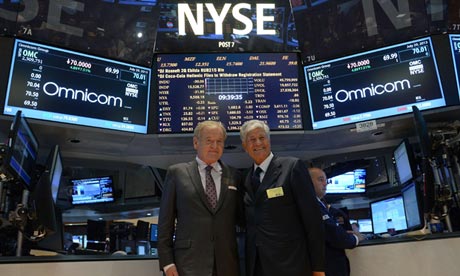Raft of disagreements between two sides leads to failure of efforts to create world’s biggest advertising group.
The proposed US$35bn merger between US-based Omnicom and French rival Publicis has been called off as the challenges in forming the world’s largest advertising agency proved too immense for the partners.
Omnicom and Publicis
The deal – heralded in July as a merger of equals that would vault the two agencies into a more digital age – foundered on issues ranging from its complex tax structure to the firms’ divergent cultures.
“There was no one factor,” said the Omnicom chief executive, John Wren, 61.
“There are a lot of complex issues we haven’t resolved. There are strong corporate cultures in both companies that delayed us for reaching an agreement. There was no clear finish line in sight.”
The two firms had justified the planned marriage as a way to provide scale and capital to cope with technological forces wrenching the advertising business.
Now, with the merger off, the companies have surrendered their potentially dominant position to current leader WPP.
“The decision to discontinue the process was neither pleasant nor an easy one to make, but it was a necessary one,” said the Publicis chief executive, Maurice Levy, 72.
Levy had previously postponed retirement as succession at Publicis remained an open issue prior to the deal. Those questions are likely to come to the fore again given the deal’s collapse.
There were a number of sticking points over the transaction, including the companies’ failure to agree on a chief financial officer who would have taken charge of implementing the deal, another source close to Publicis said.
The crucial choice of CFO, a key position that would determine how the merged company operated, had been a particular sticking point as the months dragged on.
Tax issues were also thorny as Wren first publicly signalled in an April conference call when he said they had yet to get approval for their plan to have tax residency in Britain, while being legally headquartered in the Netherlands.
As the companies struggled to keep the merger on track they had faced a fight to retain clients and talent.
The planned merger had called for a 50-50 ownership split of the equity in the new company, Publicis Omnicom Group, with Wren and Levy serving as co-CEOs for 30 months from the closing. Neither company will pay a termination fee.
Wren and Levy originally celebrated the announced deal with champagne toasts in Paris, saying it would enable them to better compete with the likes of Google and Facebook that dominate digital advertising, which accounts for nearly a quarter of global marketing spending.
Brian Wieser, a senior analyst at Pivotal Research, said consolidation in the industry was still on the table and other deals could happen with agencies such as Interpublic Group or Havas.













